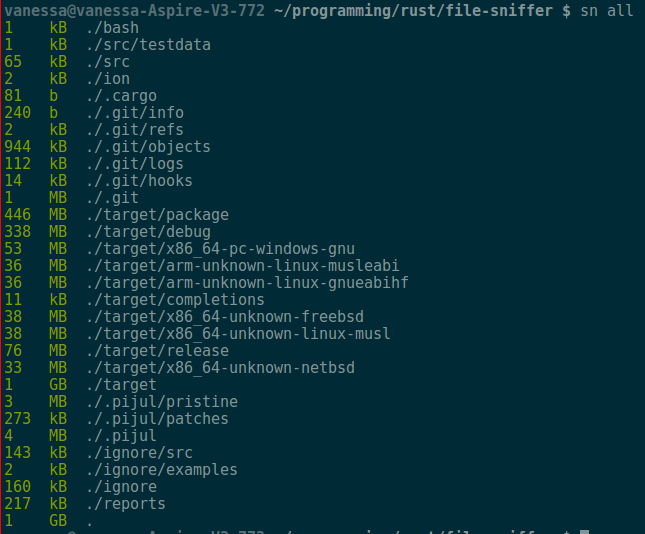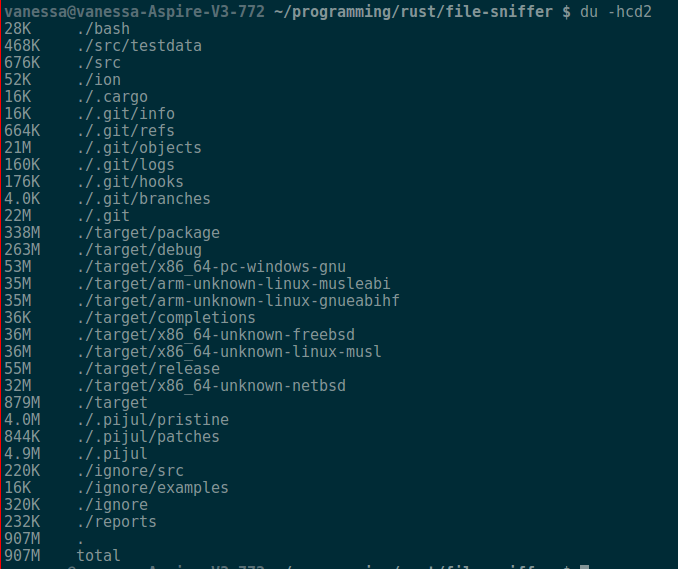https://github.com/vmchale/tin-summer
Find build artifacts that are taking up disk space
https://github.com/vmchale/tin-summer
clean cleaner command-line-tool disk-space rust
Last synced: 11 months ago
JSON representation
Find build artifacts that are taking up disk space
- Host: GitHub
- URL: https://github.com/vmchale/tin-summer
- Owner: vmchale
- License: bsd-3-clause
- Created: 2017-05-28T01:09:47.000Z (over 8 years ago)
- Default Branch: master
- Last Pushed: 2023-05-02T22:00:49.000Z (almost 3 years ago)
- Last Synced: 2025-03-27T09:12:15.652Z (11 months ago)
- Topics: clean, cleaner, command-line-tool, disk-space, rust
- Language: Rust
- Size: 637 KB
- Stars: 343
- Watchers: 8
- Forks: 15
- Open Issues: 27
-
Metadata Files:
- Readme: README.md
- Contributing: CONTRIBUTING.md
- License: LICENSE
Awesome Lists containing this project
- awesome-tools - vmchale/tin-summer - Find build artifacts that are taking up disk space (Command Line / Dependency Management)
- command-line-tools - tin-summer - Find build artifacts that are taking up disk space. (Other)
- jimsghstars - vmchale/tin-summer - Find build artifacts that are taking up disk space (Rust)
README
# The Tin Summer
[](https://ci.appveyor.com/project/vmchale/tin-summer)
[](https://travis-ci.org/vmchale/tin-summer)
[](https://crates.io/crates/tin-summer)
[](https://github.com/Aaronepower/tokei)
If you do a significant amount of programming, you'll probably end up with
build artifacts scattered about. `sn` is a tool to help you find those
artifacts.
`sn` is also a replacement for `du`. It has nicer
output, saner commands and defaults, and it even runs faster on big directories
thanks to multithreading.
## Installation
### Script
Enter the following in a command prompt:
```
curl -LSfs https://japaric.github.io/trust/install.sh | sh -s -- --git vmchale/tin-summer
```
### Binary install
If the script doesn't work for you, you can download a binary from the [releases
page](https://github.com/vmchale/tin-summer/releases).
### Cargo
If your platform doesn't have binaries, or you just want to build from source, get [cargo](https://rustup.rs/). Then:
```bash
$ cargo install tin-summer
```
Make sure you are on nightly; otherwise
```bash
$ rustup run nightly cargo install tin-summer
```
## Use
To list directory and file sizes for the current directory:
```
$ sn f
```
To get a list of directory sizes concurrently, excluding version control:
```
$ sn p --exclude '\.git|\.pijul|_darcs|\.hg'
```
To get a sorted list of the 12 biggest directories in `$DIR`:
```
$ sn sort $DIR -n12
```
To search current directory for directories with build artifacts:
```bash
$ sn ar
```
To look for artifacts or directories containing artifacts that occupy more than 200MB of disk space:
```bash
$ sn ar -t200M
```
### Accessibility
To turn off colorized output:
```bash
export CLICOLOR=0
```
### Comparison (or, 10 Things I Hate About du)
#### Reasons to use `du`
* Reads disk usage, not just file sizes
* Optionally dereferences symlinks
* Slightly faster on small directories
* Stable and well-supported
#### Reasons to use `sn`
* Faster on large directories
* Uses [regex](https://github.com/rust-lang/regex) for exclusions, making it
dramatically faster than `du` when used with the `--exclude` flag.
* Defaults to human-readable output
* Colorized output
* Nicer help via [clap](https://github.com/kbknapp/clap-rs)
* Provides sorted output
* Finds build artifacts
* Reads file sizes, not disk usage
* Extensible in Rust
#### Benchmark results
| Directory Size | Tool | Command | Time |
| -------------- | ---- | ------- | ---- |
| 600MB | sn | `sn p` | 60.74 ms |
| 600MB | sn | `sn d` | 99.92 ms |
| 600MB | du | `du -hacd2` | 88.28 ms |
| 4GB | sn | `sn p`| 185.2 ms |
| 4GB | sn | `sn d` | 271.9 ms |
| 4GB | du | `du -hacd2` | 195.5 ms |
| 700MB | sn | `sn p` | 91.05 ms |
| 700MB | sn | `sn d` | 176.3 ms |
| 700MB | du | `du -hacd2` | 153.8 ms |
| 7MB | sn | `sn p` | 19.48 ms |
| 7MB | sn | `sn d` | 12.72 ms |
| 7MB | du | `du -hacd2` | 10.13 ms |
These commands are all essentially equivalent in function, except that `sn p`
may use more threads than `sn a` or `du`. Results were obtained using Gabriel Gonzalez's [bench](https://github.com/Gabriel439/bench)
tool. You can see pretty criterion graphs
[here](http://vmchale.com/bench/tin-summer.html) or
[here](http://vmchale.com/bench/tin-summer-parallel.html).
In summary: yes, `sn` actually is faster on larger directories, but it is also
slower on small ones. I'm hoping to make it faster in the future; the current
naïve concurrency model has obvious directions for improvement.
#### Screenshots (alacritty + solarized dark)
##### The Tin Summer

##### du

### Heuristic for build artifacts
Currently, `sn` looks for files that either have an extension associated with
build artifacts, or executable files that are ignored by version control. It also looks for "build
directories", like `.stack-work`, `elm-stuff`, etc. and if it finds a
configuration file like `tweet-hs.cabal`, it considers *all* their
contents to be build artifacts.
#### Languages Supported
The following is a list of languages `sn artifacts` has been tested with.
The *intent* is to support basically anything, so feel free to open a PR or start an issue.
- [x] Haskell (incl. GHCJS)
- [x] Rust
- [x] Julia
- [x] Python
- [x] Elm
- [x] Nim
- [x] Vimscript
- [x] TeX
- [x] Idris
- [x] FORTRAN
- [ ] Ruby
- [ ] C
##### Autoclean
`sn` can clean up your artifacts for you, but only for the above-indicated
languages. It is still experimental, but it has been tested and should not
delete unwanted files (though it may not clean everything it should).